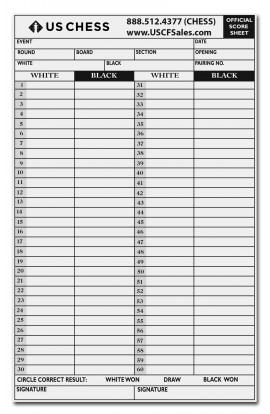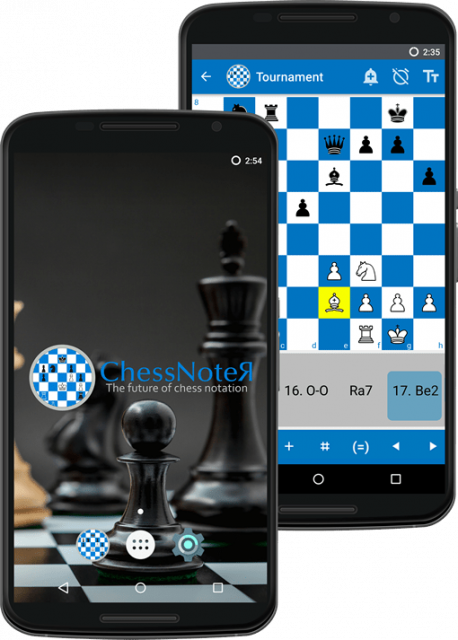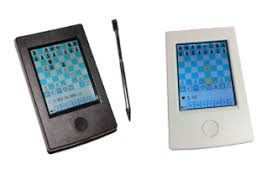
The world of chess notation is really confusing. It is not easy remembering when scorekeeping is required and when it is optional—yes, there are times it is optional. Below is a fun quiz to help you learn those exceptions. Of course to make it easy to remember if notation is optional or not just simply try to take notation all of the time. That-a-way you don’t need to waste brain matter trying to recall when it is necessary and when it is not. Besides, with notation you have one more piece of evidence when you make a claim.
True or False?
1) Your opponent’s timer displays only four minutes of playing time left in a regular rated sudden death time control. You have seven minutes of thinking time remaining. You stop taking notation, and your adversary makes a claim that you must take notation: you have more than five minutes of time left on your clock! He insists that only wood pushers with less than five minutes of playing time displayed on their clock are excused from notating.
Show Solution
- FALSE: In any time control where the total playing time is 30 minutes or longer, with or without sudden death, if either one of the players has less than five minutes of time left in any time control, neither player is required to take notation. But remember, without notation it will be difficult to provide proof for any claim you might have.

2) Your opponent is not taking notation in your dual rated G/29, d10 contest. He claims that since the game is both Regular and Quick rated—and Quick rated chess games don’t require notation—that you are both exempt from keeping a game score.
Show Solution
- FALSE: Notation is needed. In this game the base time + the sudden death time totals 39 (29 + 10). Games that total 30 minutes of playing time, or longer, require notation—even if they are dual rated. Why is a game dual rated? That is a topic for another column.

3) You do not need to take notation in Quick and Blitz rated games.
Show Solution
- TRUE: In contests that are only Quick or Blitz rated no notation is required. If a game has a total playing time (base time control + sudden death, or increment) that is less than 30 minutes, then no notation is required; however, it gets tough to make claims without a scoresheet.
4) In tournaments that use increment time controls of 30 seconds or longer the players must take notation for every move—even in the last five minutes of the time control.
Show Solution
- TRUE: The idea is that players have plenty of time to write down their moves, even in a time a crunch.
5) Checkmarks on scoresheets count the same as notation.
Show Solution
- FALSE: Check marks don’t mean a thing notation wise.
6) Blind and disabled players do not need to keep score.
Show Solution
- FALSE: Some individual players require special notation rules; however, even they still need to keep score. We value making chess more accessible and all wood pushers are allowed a variety of scorekeeping options. Ask the TD to explain those rules if you need more information.
See a TD if your opponent is not taking notation and should be.
Do you want to know more about those elusive digital scorekeeping usage guidelines? This column was about to review those rules but Chess Life for Kids (April 2018, page 23
) already did an excellent job of covering those guidelines—so, check it out.
Next month, more notes on notation.
 Tim Just is a National Tournament Director, FIDE National Arbiter, and editor of the 5th & 6th edition of the US Chess Rulebook. He is also the author of My Opponent is Eating a Doughnut & Just Law, which are both available from US Chess Sales and Amazon/Kindle. Additionally, Tim recently revised The Guide To Scholastic Chess, a guide created to help teachers and scholastic organizers who wish to begin, improve, or strengthen their school chess program. Tim is also a member of the US Chess Rules Committee and his new column exclusive to US Chess, “Just the Rules” will help clarify potentially confusing regulations.
Tim Just is a National Tournament Director, FIDE National Arbiter, and editor of the 5th & 6th edition of the US Chess Rulebook. He is also the author of My Opponent is Eating a Doughnut & Just Law, which are both available from US Chess Sales and Amazon/Kindle. Additionally, Tim recently revised The Guide To Scholastic Chess, a guide created to help teachers and scholastic organizers who wish to begin, improve, or strengthen their school chess program. Tim is also a member of the US Chess Rules Committee and his new column exclusive to US Chess, “Just the Rules” will help clarify potentially confusing regulations. The world of chess notation is really confusing. It is not easy remembering when scorekeeping is required and when it is optional—yes, there are times it is optional. Below is a fun quiz to help you learn those exceptions. Of course to make it easy to remember if notation is optional or not just simply try to take notation all of the time. That-a-way you don’t need to waste brain matter trying to recall when it is necessary and when it is not. Besides, with notation you have one more piece of evidence when you make a claim.
True or False?
1) Your opponent’s timer displays only four minutes of playing time left in a regular rated sudden death time control. You have seven minutes of thinking time remaining. You stop taking notation, and your adversary makes a claim that you must take notation: you have more than five minutes of time left on your clock! He insists that only wood pushers with less than five minutes of playing time displayed on their clock are excused from notating.
The world of chess notation is really confusing. It is not easy remembering when scorekeeping is required and when it is optional—yes, there are times it is optional. Below is a fun quiz to help you learn those exceptions. Of course to make it easy to remember if notation is optional or not just simply try to take notation all of the time. That-a-way you don’t need to waste brain matter trying to recall when it is necessary and when it is not. Besides, with notation you have one more piece of evidence when you make a claim.
True or False?
1) Your opponent’s timer displays only four minutes of playing time left in a regular rated sudden death time control. You have seven minutes of thinking time remaining. You stop taking notation, and your adversary makes a claim that you must take notation: you have more than five minutes of time left on your clock! He insists that only wood pushers with less than five minutes of playing time displayed on their clock are excused from notating.
 2) Your opponent is not taking notation in your dual rated G/29, d10 contest. He claims that since the game is both Regular and Quick rated—and Quick rated chess games don’t require notation—that you are both exempt from keeping a game score.
2) Your opponent is not taking notation in your dual rated G/29, d10 contest. He claims that since the game is both Regular and Quick rated—and Quick rated chess games don’t require notation—that you are both exempt from keeping a game score.
 3) You do not need to take notation in Quick and Blitz rated games.
3) You do not need to take notation in Quick and Blitz rated games.
 Tim Just is a National Tournament Director, FIDE National Arbiter, and editor of the 5th & 6th edition of the US Chess Rulebook. He is also the author of My Opponent is Eating a Doughnut & Just Law, which are both available from US Chess Sales and Amazon/Kindle. Additionally, Tim recently revised The Guide To Scholastic Chess, a guide created to help teachers and scholastic organizers who wish to begin, improve, or strengthen their school chess program. Tim is also a member of the US Chess Rules Committee and his new column exclusive to US Chess, “Just the Rules” will help clarify potentially confusing regulations.
Tim Just is a National Tournament Director, FIDE National Arbiter, and editor of the 5th & 6th edition of the US Chess Rulebook. He is also the author of My Opponent is Eating a Doughnut & Just Law, which are both available from US Chess Sales and Amazon/Kindle. Additionally, Tim recently revised The Guide To Scholastic Chess, a guide created to help teachers and scholastic organizers who wish to begin, improve, or strengthen their school chess program. Tim is also a member of the US Chess Rules Committee and his new column exclusive to US Chess, “Just the Rules” will help clarify potentially confusing regulations.






